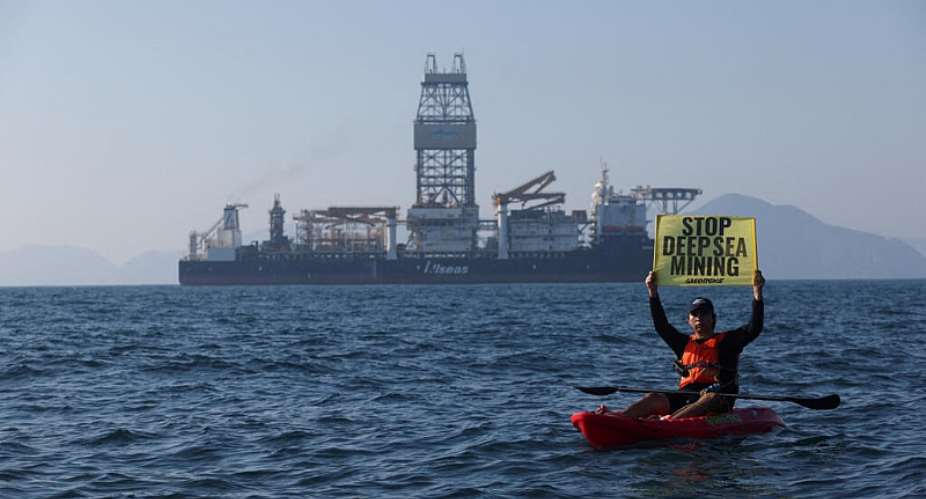India hopes to widen an undersea hunt for limitless metals that hold the key to clean energy. The move comes amid warnings from France and others that harvesting the seas could devastate ecosystems.
India, already the holder of two exploration rights, has sought two more from the International Seabed Authority (ISA).
The country wishes to expand its hunt for cobalt, nickel, copper and manganese – materials that are essential for making solar panels, electric vehicles and defence systems.
India's latest applications seek permissions to explore a vast patch of 75,000 square kilometres of the metal-rich Indian Ocean covering 70.5 million square kilometres of the planet.
More than 1.5 million square kilometres of the international seabed have already been marked for exploration.
A clearance by the Jamaica based ISA will make India's seabed permit count climb to four, bringing it on par with Russia and one behind China, a nation opposed to any pause to underwater activity.
Sri Lanka has also staked a claim on a patch in the Bay of Bengal.
Several countries have opposed the mad rush by maritime prospectors. French President Emmanuel Macron, in 2022, became the first head of state to seek an outright ban on undersea mining in international waters, though this has not yet eventuated.
Natural historian David Attenborough lent his voice as he, too, wants a halt to deep sea mining, describing it as the destruction of “an ecosystem about which we know pathetically little”.
Seabed sprint
All eyes are on ISA for the 1.2 million square kilometres of seabed it has opened for exploration with 30 licences granted since 2001.
The UN-backed organisation is set to publish mining regulations next year.
“We are at the threshold of a new era of deep seabed mining,” said ISA secretary general Michael Lodge, predicting a fevered race among stakeholders.
Analysts say India's move to seek new licences will provoke China – a country with 17 percent of the licensed area.
“China will have rights to 92,000 square miles of seabed once commercial mining gets the green light,” a Delhi-based Asian ambassador said.
“It is an excellent idea to have countries like India and others to act as a counterweight to our Communist friend,” the diplomat added on the condition of anonymity.
“China must know that it takes two to tango,” they said on the anticipated race between nations to take claims to maritime windfalls worth tens of billions of euros.
Marine riches
India estimates that 380 million tonnes of rare deposits in the Indian Ocean basin will easily cross the staggering mark of 102 billion euros.
A bonus of gold and silver is also likely among the treasure trove, according to India's government, which in 2019 forked over 887 million euros for exploration.
Another sum of 452 million euros was set aside in 2021 for five years.
The appetite for marine reserves has prompted several countries, including India, to start developing submersibles to carry humans to a depth of six kilometres.
ISA says the limitless deposits in the Indian Ocean can make India self-sufficient and help the world's third largest emitter reach its promised net zero target by 2070.





 Kenya Airways says to resume flights to Kinshasa after staff freed
Kenya Airways says to resume flights to Kinshasa after staff freed
 Junta-led Chad counts votes in first for coup-hit region
Junta-led Chad counts votes in first for coup-hit region
 President Akufo-Addo appoints Joyce Adjoa Agyeiwaa as Birim Central MCE
President Akufo-Addo appoints Joyce Adjoa Agyeiwaa as Birim Central MCE
 Cedi depreciation has been lower under NPP administration – Bawumia
Cedi depreciation has been lower under NPP administration – Bawumia
 Akufo-Addo has been vindicated in selecting me as his Vice President – Dr. Bawum...
Akufo-Addo has been vindicated in selecting me as his Vice President – Dr. Bawum...
 AstroTurf Project Sabotage: Asunafo North MP accuses NDC PC Haruna Mohammed
AstroTurf Project Sabotage: Asunafo North MP accuses NDC PC Haruna Mohammed
 Election 2024: I’m ready to serve Ghana with my heart, energies – Bawumia
Election 2024: I’m ready to serve Ghana with my heart, energies – Bawumia
 We saved Ghana $19million in 2020 elections – EC
We saved Ghana $19million in 2020 elections – EC
 Nobody has ever enticed me with money to rule in his or her favour — Otumfuo
Nobody has ever enticed me with money to rule in his or her favour — Otumfuo
 Court convicts student for issuing GHC50,000 dud cheque
Court convicts student for issuing GHC50,000 dud cheque
